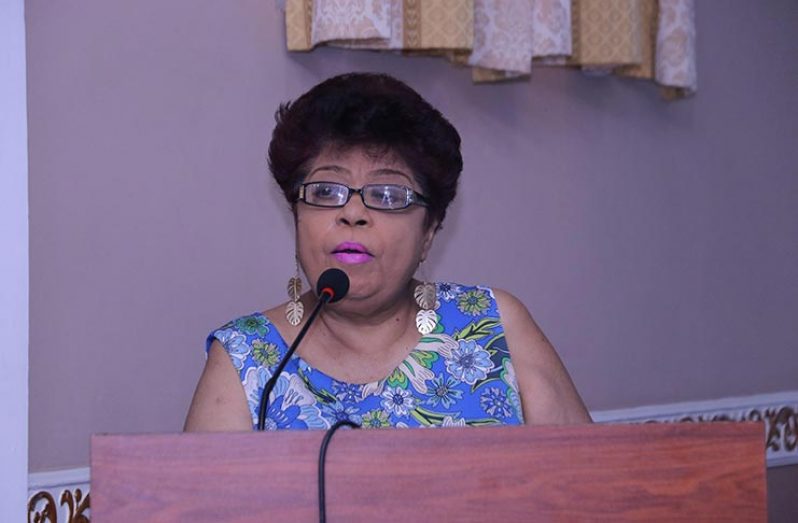THOUGH there has been a drop in the number of abused and abandoned children living in orphanages across Guyana, there is still a grave need for foster parents, especially in the outlying regions.
By the end of December, 2015, there were in excess of 700 children institutionalised in 23 homes. Today, the figure stands at approximately 500 but the Child Care and Protection Agency (CCPA) said the figure can be further reduced if more persons take up the mantle of becoming foster parents.
On the sideline of a foster parents’ seminar at the Regency Suites on Saturday, acting supervisor of the CCPA Foster Care Department, Felina Maikoo, told Guyana Chronicle that more abused and neglected children are being placed into extended families through a kinship system.
“If a child can’t remain with his birth parents, we look for extended family members – that is always the first option,” she told this newspaper while noting that the increasing use of the kinship system is contributing to the decline in the number of children in residential institutions.

However, Maikoo believes that there can be a greater dent in the number of children living in orphanages if persons step up to the task and foster children. Presently, there are close to 180 children in Foster Care being parented by approximate 120 foster parents registered under the programme.
Children are often removed from their primary caregivers because they were abused or faced the likelihood of being a victim of abuse, whether it is a case of physical or sexual abuse, neglect or abandonment.
Foster care, therefore, serves an alternative arrangement for children who would have been removed from their biological parents for a variety of reasons but the Foster Care Department continues to experience difficulties in retaining some of its foster parents.
“Some of those challenges are due to the difficulty in bonding with children and then releasing those children,” Maikoo explained, noting that most persons have a preference for permanent care as against temporary care.
While there are emergency placements that would last for about two weeks or more, a person usually foster’s a child for a period of six months or more, but never permanently under the programme.
With 500 children in residential institutions, Maikoo said the need for foster parents is greater in outlying regions.
“I would say that the greatest need is in the outlying regions because in those regions we don’t have the residential care institutions to place children when they are removed and they are at risk in the biological families, so the need is grave in the outlying regions for foster parents and for the foster care system,” she explained.
It was pointed out that the 23 children homes – three of which are owned by the Government – are situated in Regions Three, Four and Six.
“In Region Seven, we have none. In Region One, we don’t have. In Region Two, there is none, neither in Region 10. So we need a robust foster care system in those outlining regions,” she added.
The process of becoming a foster parent is very simple, since it is not an adoption and does not require the legal process of going to the court to get custody of a child. Any person desirous of becoming a foster parent would need to complete an application form provided by the agency before a home study and visit are done.
Additionally, the agency would conduct criminal and medical checks on the applicant before an appointment is made with the CCPA Director.

The director has the authority to approve or disapprove the application based on the findings. However, if the approval is granted, the applicant will be placed on a foster care register before being matched with a child from one of the residential homes.
During the opening ceremony of the Foster Parent Training Seminar, Minister of Social Protection Amna Ally said though the decision to remove a child from their home is always a difficult one, the CCPA is duty bound to act in the best interest of the child.
“I strongly believe that every child deserves and should be given an opportunity to succeed and to grow up in a safe, stable and nurturing environment that is free from abuse and neglect,” Minister Ally said.
As such, she said the two-day workshop was designed to equip new and prospective foster parents with essential knowledge and tools needed to enable them to become the best caretakers.
While the ministry through the CCPA continues to play its part, Minister Ally said it is important for foster parents to take their duty seriously.
“I would like to remind you that as new and prospective foster caretakers, you have taken up the mantle to assist us in achieving the vision of a future that will ensure that our vulnerable children grow up in the environment most positive and natural for their growth, well-being and protection,” she implored the parents.
CCPA Assistant Director Tionna October said though fostering children is not an easy task, it is worth it. “I would love to stand here and tell you that being a foster parent is easy but it’s not. It can be extremely isolating. It’s the rare person who understands all the in’s and out’s of the system: birth parent visits, reunification goals, permanency plans, and the long list of regulations we’re expected to uphold,” she said.
Both October and the Social Protection Minister used the opportunity to thank those persons who have opted to provide a safe haven for children who have endured abuse or neglect, or are at risk. The training programme was facilitated by Ismay Griffith, who from the onset said that caring for children requires a village, or more so team work. Some 40 foster parents, some of them accompanied by their children, attended the forum.




.jpg)










